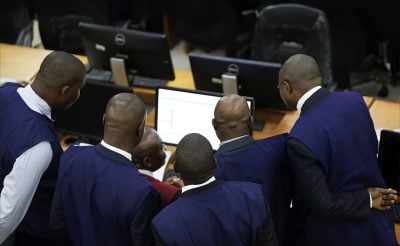In June, the US Treasury Department notified members of Congress that “a recent assessment of the State Department has determined that Ethiopia is no longer engaging in a pattern of gross violations of human rights.”
This assessment paves the way for the US to lift the economic sanctions that the country has imposed on Ethiopia for more than two years. In May 2021, the US secretary of state, Antony Blinken, announced visa restrictions for Ethiopian and Eritrean officials “responsible for, or complicit in, undermining resolution of the crisis in Tigray”.
In August that year, the US Treasury Department started to sanction high-ranking military officials that the US believed to be responsible for human rights abuses and corruption. In January 2022, the Office of the US Trade Representative ousted Ethiopia from the Agoa (Africa Growth and Opportunity Act) trade programme, an initiative that offers duty-free access to American markets.
This inflicted a heavy economic punishment on Ethiopia: the American trade scheme had helped generate employment opportunities for 100,000 Ethiopians and earned the East African country approximately $100m annually. The sanctions have contributed to an increasingly serious economic situation in Ethiopia, which is now teetering on the edge of default.
The move to drop allegations of human rights abuses against Ethiopia has proved controversial in some quarters, not least in light of a report from Human Rights Watch in June that outlined how Ethiopian authorities in Western Tigray had “continued an ethnic cleansing campaign against Tigrayans” – even after the peace deal that formally ended the civil war in November 2022.
Joseph Gebreslassie, a human rights activist from Tigray, tells African Business that “there have been verified reports of widespread civilian massacres, extrajudicial executions, sexual and gender-based violence, weaponised starvation, looting, destruction of healthcare facilities, and forced displacement of millions of Tigrayans.
“The picture emerging from these seven months of war – albeit incomplete due to a telecommunications blockade affecting large swathes of the region – provides a glimpse into the level of devastation in Tigray. According to the latest figures, over 70,000 civilians have been killed in Tigray, while 70,000 have been forced to seek refuge in Sudan, and 2.2m more people have been internally displaced.
“Of the region’s 7m residents, more than 90% are in dire need of emergency food assistance, including 2.3m children.”
Given this, Gebreslassie condemns Washington’s move to drop allegations of human rights violations and wants major powers to focus on “getting justice for the people of Tigray”.
Economic impact
The most immediate economic impact of Washington’s move could be increased flows of humanitarian aid to Ethiopia. While imposing sanctions on Ethiopia, the US gave the country more than $1.5bn in humanitarian assistance in 2022. These sums could now increase further.
Perhaps more importantly, the move could also help Ethiopia finally secure a debt restructuring deal with the International Monetary Fund (IMF). Abiy Ahmed’s government first requested debt relief under the G20 Common Framework over two years ago.
Ethiopia has struggled to keep up with its debt repayments amidst a weakening birr, stronger dollar, and higher interest rates that have pushed up repayment costs. The East African country has therefore requested a loan of at least $2bn from the IMF to help cover its liabilities, although the IMF has calculated that Ethiopia faces financing gaps of at least $6bn until 2026.
The US is partly responsible for the delays to Ethiopia’s deal with the IMF because, under its domestic law, American officials at international financial institutions are legally obliged to oppose proposals to offer loans or financial assistance to countries engaged in human rights abuses.
But given the apparent shift in the US position, its officials at the IMF could offer their support to an Ethiopian debt restructuring deal. This in turn would help Addis Ababa avert a debt default, preserve or improve upon their credit rating, and thereby access capital at more competitive rates on international markets.
Ethiopia applies to join BRICS
At the end of June Ethiopia’s Foreign Ministry announced that the country has asked to join the BRICS bloc of emerging market economies. This is an important development that could have broader economic and geopolitical implications as Ethiopia becomes increasingly embroiled in the diplomatic battle for influence in Africa. Two other African countries – Algeria and Egypt – have already formally applied for membership and several others, including Nigeria and Senegal, have expressed their interest in joining.
The bloc – which currently consists of Brazil, Russia, India, China, and South Africa – is widely seen as a potential challenger to Western economic hegemony. BRICS has sought to establish new financial institutions, such as development banks, that could undermine the Bretton Woods system and ultimately chip away at the influence of Western-dominated organisations such as the World Bank and the IMF. There have even recently been suggestions that the bloc could usher in a BRICS currency that could challenge the US dollar’s status as the world’s reserve currency.
Ethiopian membership of BRICS would be a significant coup for the bloc given the East African country’s economic importance. Ethiopia is the second most populous country in Africa and and has for much of this century had one of the fastest-growing economies anywhere in the world. The government is currently in the process of privatising many state-owned enterprises and liberalising whole swathes of industry, including banking and telecommunications, which could unleash even faster economic growth. Ethiopia is also seen as an important strategic partner given its proximity to Somalia and therefore its crucial role in countering global terrorism.
Washington’s decision suggests the US recognises the risk of pushing the country further into the hands of the BRICS. The Biden administration, which last year hosted a summit of African leaders in a bid to repair the image of the US on the continent, has sought to emphasise the importance of aligning Western and African interests, particularly as China plays an increasingly important role in Africa.
It is likely that the outcome of Ethiopia’s BRICS application will be known after the bloc holds its next summit, which is to take place in Johannesburg from 22 to 24 August. The economic and diplomatic ramifications, both for Ethiopia and more broadly, could be significant.
Want to continue reading? Subscribe today.
You've read all your free articles for this month! Subscribe now to enjoy full access to our content.
Digital Monthly
£8.00 / month
Receive full unlimited access to our articles, opinions, podcasts and more.
Digital Yearly
£70.00 / year
Our best value offer - save £26 and gain access to all of our digital content for an entire year!

 Sign in with Google
Sign in with Google 



